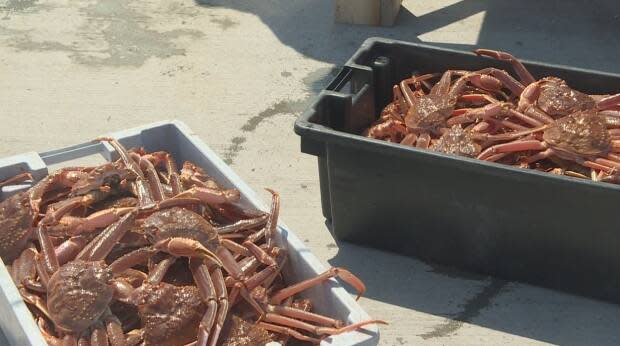Temporary foreign workers have been quarantined for more than 25 days on Quebec's North Shore

Mario Castillo has been in quarantine for 26 days.
The 31-year-old from Campeche, Mexico landed in Montreal on March 19 to start work at a crab processing plant on the North Shore.
But despite receiving a negative COVID-19 test on March 16, before his flight, and another upon his arrival in Canada a few days later, the results of a mandatory test on day 10 of his quarantine have yet to come back.
Anyone travelling to Canada is obligated to get a negative test result within 72 hours of their flight to Canada, to be tested again after they land, and a third time on day 10 of their quarantine.
After his mandatory three-day hotel quarantine in Montreal, Castillo and 35 other temporary foreign workers took a nine-hour bus ride to Baie-Comeau, where nearly half have been isolated in a hotel ever since.
Seventeen of the workers, including Castillo, had issues with their Switch Health tests, which were sent to the Toronto-based company charged with analyzing COVID-19 tests.
Until the results come back, the workers cannot end their quarantines.
Despite that, Castillo and the three dozen other temporary foreign workers with whom he travelled took an additional test — one with the regional health authority — which was negative.
"I would assume there's a backlog," said Marilyn Clark, who is responsible for temporary foreign worker recruitment at Crustacés Baie-Trinité, the seafood processing plant 90 kilometres east of Baie-Comeau, where Castillo is set to work.
Plant struggling to find workers
Meanwhile, Clark said, the processing plant is short on workers for the brief two-month crab season.
Many seafood processing plants in Quebec rely on temporary foreign workers to get through the fishing season, and Clark said Crustacés Baie-Trinité has been forced to sell unprocessed crab because half its temporary foreign workers are still in quarantine.
"The intent is that we have a market-ready product," she told Quebec AM, adding that hasn't been possible because of the staffing crunch.
The company is also footing the bill for the hotel stays and the workers' food while they're in isolation, on top of salaries for 30 hours a week of work they can't do.
But the workers are frustrated too. Castillo said the half of his group that's working at the plant is able to make overtime and send more money back home to their families in Mexico.
In the meantime, he's grateful the hotel gave him permission to use the kitchen to cook for everyone while they get accustomed to "bland" Canadian food.
Other provinces running more smoothly
Clark, who also does recruitment of temporary foreign workers headed to New Brunswick, said even people who arrived on the same flight as Castillo in Montreal and then travelled to the Maritimes, are already on the job.
She said those workers got tested through the New Brunswick government and were able to get to work after their 14-day quarantine.
Government needs a solution before thousands more arrive: farmers
The head of Quebec's largest farmers' union, the Union des producteurs agricoles (UPA), told Radio-Canada the federal government needs to find a solution as soon as possible, because the number of temporary foreign workers headed to Canada in the next few weeks is only going to increase.
"We implore the government to offer alternatives, or to be able to bring these workers to Quebec screening centres so that the results can be obtained as quickly as possible," Marcel Groleau said. "Otherwise enlist private companies that offer this type of service in order to unclog the system, which we can see does not work."
Switch Health spokesperson Jordan Paquet said he couldn't comment on the specific case of the workers in Baie-Comeau, but said with often unreliable internet in rural areas, it can be challenging to walk people through the tests virtually, which means some aren't analyzed, due to technicalities.
"There have been circumstances where our at-home collection kits have not been correctly registered by individuals taking the test, which means that the lab would not be able to run the test," he said in an email. "In these instances, we send out a replacement kit via our courier partners, which then needs to be readministered and sent back to our labs."
"This process can lead to a delay in individuals receiving their results," he added.
Paquet also said there are certain populations in Quebec for which the company is not contracted specifically to provide additional services, and any issues when it comes to testing temporary foreign workers should be addressed to the provincial government.

 Yahoo Movies
Yahoo Movies 